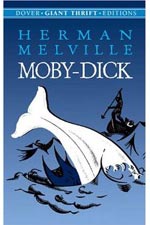 People are often surprised to hear that Herman Melville’s masterpiece, Moby Dick, was inspired, at least in part, by the sinking of the whale ship Essex by a sperm whale. By all accounts the sinking of the Essex haunted Melville and unquestionably supplied him with ending of his novel.
People are often surprised to hear that Herman Melville’s masterpiece, Moby Dick, was inspired, at least in part, by the sinking of the whale ship Essex by a sperm whale. By all accounts the sinking of the Essex haunted Melville and unquestionably supplied him with ending of his novel.
This was not the only inspiration for Moby Dick, however. There was indeed a rogue white sperm whale, well know to whalers in the early 1800’s. He was often seen near the island of Mocha, off southern Chile, and was nicknamed Mocha Dick. Mocha Dick was said to have killed more than 30 men, and to have attacked and damaged 14 whaleboats and three whaling ships.
In May 1839 the Knickerbocker Magazine, a popular publication in New York City, published a lengthy article about Mocha Dick by Jeremiah N. Reynolds an American journalist and explorer.
MOCHA DICK: OR THE WHITE WHALE OF THE PACIFIC: A LEAF FROM A MANUSCRIPT JOURNAL.
This renowned monster, who had come off victorious in a hundred fights with his pursuers, was an old bull whale, of prodigious size and strength. From the effect of age, or more probably from a freak of nature, as exhibited in the case of the Ethiopian Albino, a singular consequence had resulted he was white as wool!
Viewed from a distance, the practised eye of the sailor only could decide, that the moving mass, which constituted this enormous animal, was not a white cloud sailing along the horizon. On the spermaceti whale, barnacles are rarely discovered; but upon the head of this lusus naturae, they had clustered, until it became absolutely rugged with the shells. In short, regard him as you would, he was a most extraordinary fish; or, in the vernacular of Nantucket, ‘a genuine old sog,’ of the first water.
Opinions differ as to the time of his discovery. It is settled, however, that previous to the year 1810, he had been seen and attacked near the island of Mocha. Numerous boats are known to have been shattered by his immense flukes, or ground to pieces in the crush of his powerful jaws; and, on one occasion, it is said that he came off victorious from a conflict with the crews of three English whalers, striking fiercely at the last of the retreating boats, at the moment it was rising from the water, in its hoist up to the ship’s davits.
It must not be supposed, howbeit, that through all this desperate warfare, our leviathan passed scathless. A back serried with irons, and from fifty to a hundred yards of line trailing in his wake, sufficiently attested, that though unconquered, he had not proved invulnerable. From the period of Dick’s first appearance, his celebrity continued to increase, until his name seemed naturally to mingle with the salutations which whalemen were in the habit of exchanging, in their encounters upon the broad Pacific; the customary interrogatories almost always closing with, ‘Any news from Mocha Dick?’ Indeed, nearly every whaling captain who rounded Cape Horn, if he possessed any professional ambition, or valued himself on his skill in subduing the monarch of the seas, would lay his vessel along the coast, in the hope of having an opportunity to try the muscle of this doughty champion, who was never known to shun his assailants.
It was remarked, nevertheless, that the old fellow seemed particularly careful as to the portion of his body which he exposed to the approach of the boat-steerer; generally presenting, by some well-timed manoeuvre, his back to the harpooner; and dexterously evading every attempt to plant an iron under his fin, or a spade on his ‘small.’ ‘Though naturally fierce, it was not customary with Dick, while unmolested, to betray a malicious disposition. On the contrary, he would sometimes pass quietly round a vessel, and occasionally swim lazily and harmlessly among the boats, when armed with full craft, for the destruction of his race. But this forbearance gained him little credit, for if no other cause of accusation remained to them, his foes would swear they saw a lurking deviltry in the long, careless sweep of his flukes. Be this as it may, nothing is more certain, than that all indifference vanished with the first prick of the harpoon; while cutting the line, and a hasty retreat to their vessel, were frequently the only means of escape from destruction, left to his discomfited assaulters.

Pingback: Maritime Monday 214